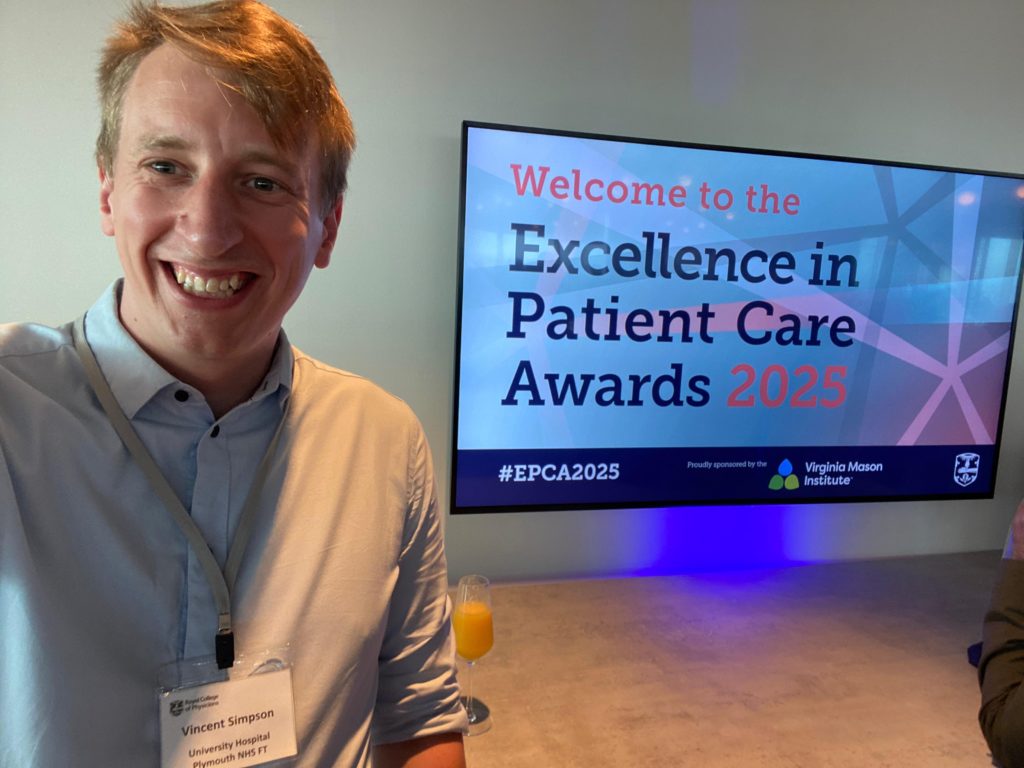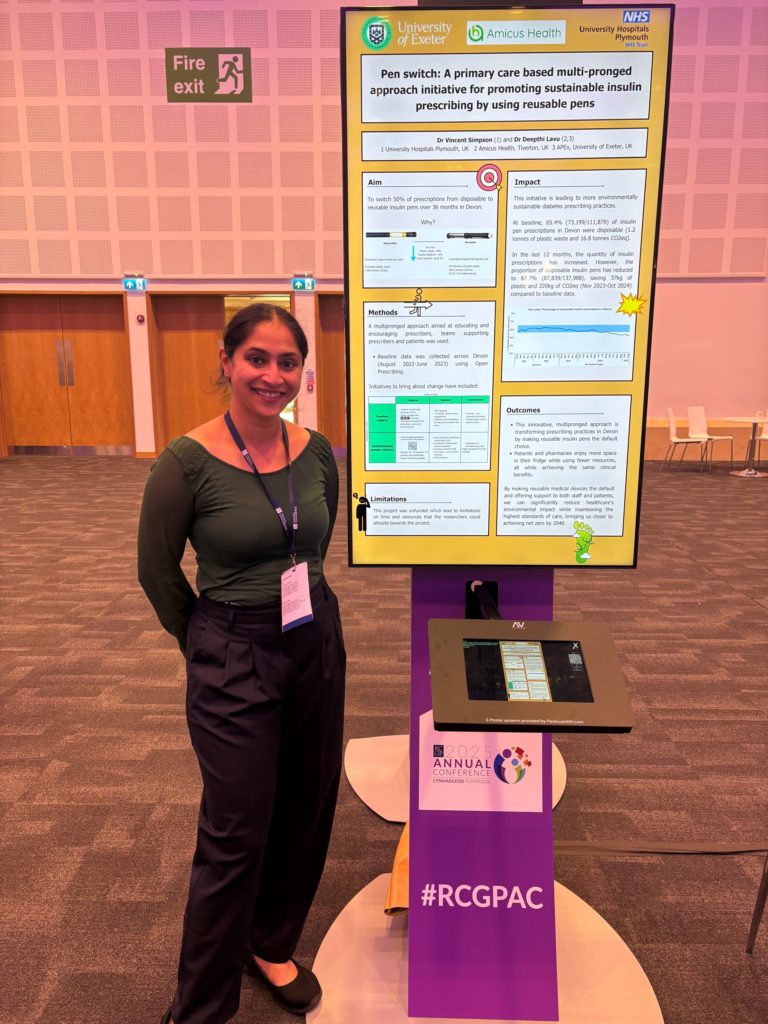Exeter Collaboration for Academic Primary Care (APEx) Blog
Exeter Collaboration for Academic Primary Care (APEx) Blog
Posted by ma403
4 November 2025Dr Vincent Simpson and Dr Deepthi Lavu

Are you a clinician who wants to change the world but is too busy or doesn’t know where to start? If the answer is yes, then we’ve got your back! Making healthcare more sustainable does not have to be hard.
We are two full-time NHS doctors who for years attempted sustainable switches in our personal lives whilst unwittingly adding back to the carbon footprint and plastic waste around us at work. At a light bulb moment, we realised the impact that some of our work had on the environment and the advantage of the position we were in, as clinicians, to initiate a positive change in the NHS. Since then, we have gone on to win awards for our work including the Sanofi Green award and the Royal College of Physicians Excellence in Patient care award and have even been on BBC spotlight. If we can do it, so can you!
Our PenSwitch story: How it started
Sometimes the best ideas happen when you’re bored! Vincent was sitting in a carbohydrate counting course struggling to keep focus, when the organiser asked the room, ‘What insulin pen do you use?’ Vincent had always presumed that everyone who was on insulin for prolonged periods would be using a reusable cartridge pen, because they’re more robust, have more features and look less medical but as they went round the room he realised that 5 of the 10 people used disposable pens. Surely that couldn’t be right!
Did they use disposable because it is cheap? Nope, it’s either more expensive or the same price. Was this a selected group not representative of users? Nope. Was it because reusable insulin pens are impossible to use? Nope, as people living with diabetes often prefer them. So what was driving the behaviour?
A scope around the endocrinology department showed that none of the consultants ever gave it much thought. Some diabetes specialist nurses had tried changing prescribing behaviour to sustainable options by repeated reminders but that hadn’t worked. So as a new registrar, Vincent decided to try things differently. A love for data and intention to implement learning on behavioural change led to the next steps.
OpenPrescribing: our secret weapon
Vincent trawled websites and wrote to everyone he knew for information. Some pharmaceutical companies had published their product life cycle assessments which were useful to quantify the difference in plastic and carbon footprint between disposable and reusable pens. The numbers were stark. By switching to a reusable insulin pen one could reduce carbon footprint by 40% and plastic waste by 90%.
The emails also paid off. A pharmacist suggested exploring the openprescribing website which meant that Vincent could now not only quantify the impact disposable pens had in England but could also continue working on the topic without funding as this information was not hidden behind a paywall. Over 3 years, 13,189,131 disposable insulin pens had been prescribed producing 70 tonnes of plastic and ~1,000 tonnes carbon footprint (~2.5 million car miles). It clearly was a big problem, though probably only the tip of the iceberg. He knew he had to get this information out there, so he did what an academic does best. He wrote a paper.
Visibility: Guidelines, partnerships and people’s voices
Vincent knew that one paper wasn’t going to be enough, so he started to work on the first sustainable diabetes guideline to structure the change he hoped to see. For effective change, ideas need buy-ins and champions to campaign a cause. Vincent had also approached his academic colleagues about his work. Enter Deepthi Lavu, an academic General Practice doctor in training. She was passionate about making the idea a success and helped mold the guideline to make it suitable for non-hospital prescribers. Vincent and Deepthi (we) were now a team.
We had to get the information out to as many prescribers as we could, so we wrote to the Integrated Care Board (ICB), pharmacists, Devon Formulary; we wrote to anyone who might listen. Initial success came as a message added to ScriptSwitch, a programme built into GP software, which prompted prescribers to switch when prescribing disposable pens. The ICB was happy to support us but did not have the finances. Devon Formulary were interested but were busy. We persisted. We presented our findings at regional diabetes education days and to get the message out to people living with diabetes we approached the University of Exeter media team who supported us. As a person with lived experience of diabetes, Adrian Tame was ready to talk to our project. His story gave the project the power it needed.
Small changes, big impact
To date our work has led to 3% reduction in disposable insulin pen use across Devon. That is an estimated 50 kg of plastic saved and 300 kg of CO2 emissions reduced (= 765 miles of car travel). We had managed to get colleagues thinking about sustainability in their own areas. People living with diabetes are asking more from manufacturers and pushing for greener products.
For this work that reflects our passion, we won the Sanofi Green Award and the RCP award and have been on the RCP podcast and talked on a Stanford podcast. We continue to spread the message that diabetes care can be world leading and sustainable. We are now working with diabetes UK, ABCD, YDEF, Breakthrough T1D, NHS England, the Department of Health and Social Care as well as people living with diabetes and industry partners to develop the world’s first sustainable diabetes care position statement. So watch this space..
How to get started: Our top tips for leading sustainability projects
Using OpenPrescribing: A Quick Guide for Busy Clinicians
OpenPrescribing.net is a free, publicly accessible website that turns NHS prescribing data into clear, actionable information.
Here’s how to get started:
Use the search bar to find prescribing data for your local NHS Trust, ICB, PCN or GP practice.
For us, it was disposable insulin pens, but you can check any drug or device.
Use the data to make your case for change.
You can use OpenPrescribing data to keep teams informed on prescribing trends.
Evidence from OpenPrescribing helped turn our simple idea to an award winning project. It is a powerful tool for anyone interested in improving prescribing practices. Why not check it out now? https://openprescribing.net/
